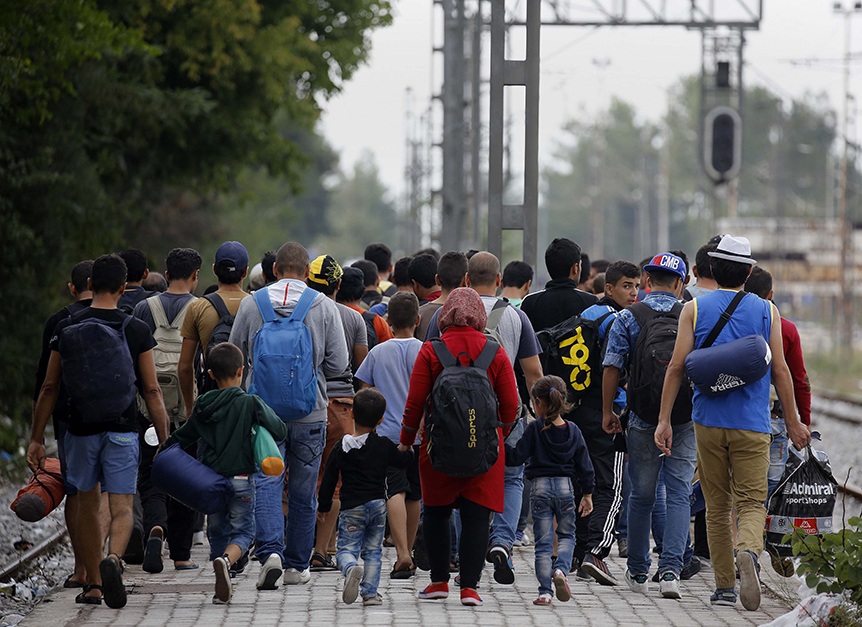Iranian critics send a message to Syria: ‘Sorry’
A small but growing group has launched a campaign apologizing for their country’s backing of Syria’s Bashar al-Assad
Syrian refugees walk towards Greece’s border with Macedonia, near the Greek village of Idomeni, September 11, 2015. Some 7,600 migrants, many of them refugees from the Syrian war, entered Macedonia from Greece between 6 p.m. (1600 GMT) on Wednesday and 6 p.m. on Thursday, an official with the United Nations refugee agency said on the border. (Yannis Behrakis/Reuters)
Share

A small group of Iranian activists inside and outside the country has launched a campaign to protest Tehran’s support for Syrian dictator Bashar al-Assad.
Among Assad’s few allies, none is more important than Iran. The Quds force of the Islamic Revolutionary Guards Corps leads Iran’s intervention in Syria. Although not deployed in large numbers, dozens of its members have died there.
Iran has also directed the entry of Shia fighters from Afghanistan, Pakistan and elsewhere into Syria. And Hezbollah, an Iranian-backed Lebanese Shia militia, has been instrumental to Assad’s survival. Thousands of Hezbollah foot soldiers have fought in Syria; hundreds have died.
But now some Iranians are voicing their opposition to Iran’s role in the war by apologizing for it.
The campaign, dubbed “Sorry Syria,” began after images of Alan Kurdi, a Syrian child refugee who drowned and as his family attempted to cross from Turkey to Greece, focused the world’s attention on the 12 million Syrians who have been displaced from their homes by the Syrian civil war.
“Some of us, we had a chat, and we think we should do something, because one of the responsible forces for the Syrian disaster is the Iranian regime,” says Mehdi Arabshali, a former Iranian political prisoner who lives in America.
Arabshali acknowledges the presence of extremist opposition forces in Syria, including the so-called Islamic State, but he says the Syrian regime is responsible for most civilian deaths in the war.
He and his fellow activists drew up a petition that was signed by about 80 people.
“As a group of Iranians, we believe it is our main responsibility to denounce the destructive intervention of the Islamic Republic of Iran, particularly the Quds force, in the Syrian crisis. We wish the Syrian people peace and dignity and support their aspiration of gaining their inalienable human rights,” it reads in part.
They then created a Facebook page that asks Iranians to post messages of support for the campaign. Among those who have done so is Shirin Ebadi, an Iranian lawyer and human rights activist who was awarded the Nobel Peace Prize in 2003.
Arabshali says most, but not all, who have signed the petition or contributed to the online campaign live outside Iran, “because inside Iran, it’s very difficult to criticize the policy of the government about Syria. It’s like a red line nowadays.”
He doesn’t expect the campaign will affect Iranian policy on Syria, at least not any time soon.
“Unfortunately, the government in Iran is not a democracy. We wanted to bring democracy to Iran, but we couldn’t, and they suppressed all of us,” he says, referring to the “Green Movement” protests that erupted after an apparently rigged presidential election in 2009 and were violently crushed.
“But I think it is very good for us to organize people, to encourage people and to inform people about what is happening in Syria. And then, if we can develop the public in Iran, maybe in the long term we can change the policy.”
The campaign’s second goal is to send a message to Syrians: “We think it’s important that Syrian people know that many Iranians do not agree with this policy. We want peace and democracy for Syria, and we do not support the Iranian regime and the support of the Iranian regime for Bashar al-Assad.”